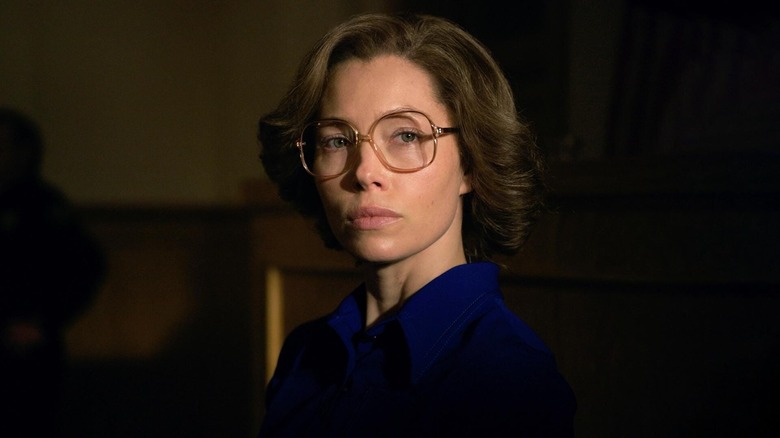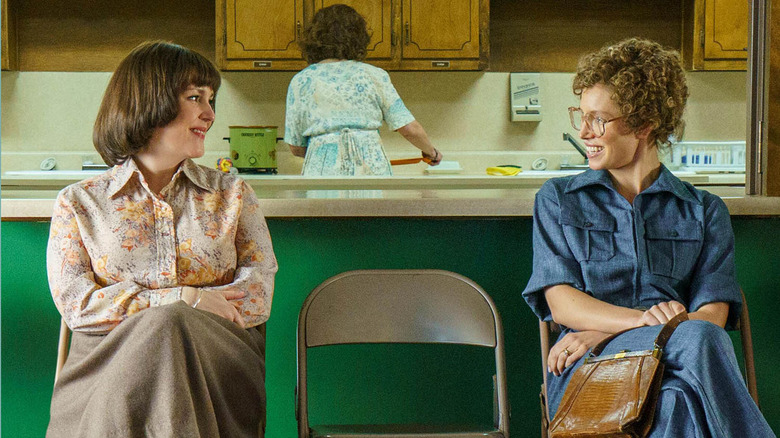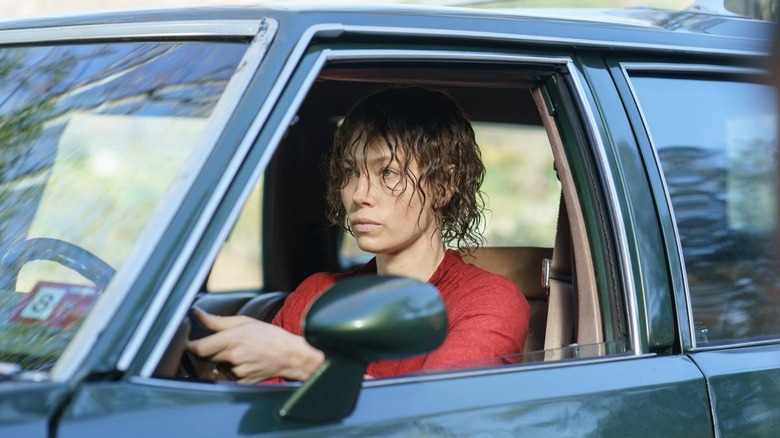Candy Composer Ariel Marx Explains Why String Music Is Great For Horror [Interview]
Ariel Marx knows how to deepen a story's sense of discomfort and horror. The composer behind "Candy," Hulu's five-part true-crime miniseries, can make even the most mundane of interactions and moments have a prevailing sense of unease. Another one of Marx's recent scores, "Shiva Baby," was basically a masterclass in how to ramp up tension, when to slow down for a breather, and when to go full-throttle.
As Marx says, she finds it cathartic.
When we spoke to the composer, she had instruments by her side — a cello, guitars, and "a little bit of everything." But Marx's main instrument of choice is strings. And with "Candy," she once again lets those strings get under an audience's skin. Recently, she told us how she unnerves viewers with her scores.
'What is it like to wake up with the same life every day, with the same tasks?'
Your use of strings creates so much anxiety.
Thank you. I enjoy it. It's a catharsis for me.
How'd you get started with string music?
I took lessons and everything, and I started off in fiddling, and then I took classical lessons, and then I took jazz lessons. I was trained for several years, but I didn't pursue it as a degree like some people do. I pursued composition.
There's a lot of empty spaces in "Candy," a lot of people looking small in these large spaces. So, how'd you want to fill those rooms with your score?
Right. Especially episode 1, a lot of what's depicted is the pace of things, and the quietness of things, the mundanity of things. This phrase that I picked up on the script, that really affected the music, was the oppressive sameness. What is it like to wake up with the same life every day, with the same tasks? Candy (Jessica Biel), at least on an outward level, approaches this life with a very different effect than Betty (Melanie Lynskey) does. The contrast of their two lives is interesting, and I think a lot of that is achieved through when these women have these private moments of loneliness, of frustration.
In episode 1, though, Candy is in her bubbly world. It was world-building, but it was from the perspective of the goal of having a perfect life. It's dreamy and melodic and gets stuck in its rudders; there's a lot of repetition, there's a lot of oppressive sameness in the music, unfinished potential or unfulfilled potential in the music. Phrases might not land where you think they will or the melody only develops so far. Then, in contrast with these extremely intentionally empty and quiet spaces, we're using the fans, the vacuums, the dishwasher, and the washing machine, and all of these kinds of daily assault of sounds of what it is to be a housewife at home.
Were you thinking of horror music at all? For example, when Candy runs down the stairs to wash her clothes after Betty's death, the music is unsettling.
Yeah, for sure. It was meant to be jarringly private. We didn't see the crime, we don't know what happened, but we're seeing the aftermath. We could have played that more neutrally, but it was very much a shock. Candy, when she comes home and she's driving erratically, and she's stopped, waiting for her garage door to open, and it's this moment where she has to wait, and be in her thoughts, and contemplate what she's just done. And so, that was very much a deliberate internal choice, because otherwise, everything was fine. All we see is the outside of the house — it's quiet, maybe we hear a baby cry — but that's the first time we get exposure to [the idea that] something's amiss.
There's a real give and take between Jessica Biel's performance and your score. You said you score based on what's happening internally, but how do you decide when the actor is already communicating that feeling?
I think all of these actors were incredible at kind of showing subtlety in their face. Their world is slowly cracking, right? Their peaceful, suburban life got turned upside down. I think there was a lot of denial, obviously, when the crime happened, but also denial of one's personal mental health, one's personal satisfaction.
The score is pretty subjective with Candy and the story is subjective with Candy, so we don't have Betty's perspective. She's a fully fledged, developed character in the show, but we don't have her voice of what happened. So sometimes the score will be right in line with Candy's outer-facing intentions, and sometimes it'll be internal. Sometimes those are mismatched. She'll be putting on a smile and we have something darker, or sometimes we double down on her attempt to convince everyone that she's just had a normal day. It's scene by scene and performance by performance, whether we want to amplify what's already there or add a subtle layer of something amiss underneath.
'It's the flexibility of intonation'
In the beginning, you're creating the world, but in the final episode, you have a court drama with a lot more story, dialogue, and exposition. How did you approach the final episode?
Yeah, so the fifth episode is a different format. It was a way for me to wrap up my themes and my ideas. Because of the location and the exposition of it, like you said, there was a different way that score had to live. There was a bit more score in that to help kind of push these revelations along. The trial was so bizarre that the music did, in the spirit of the previous score, highlight those moments of shock, of horror, of sadness.
I think, in every way, we're still in the world of Candy, but we're not [in] the safely established suburban homes. Candy is under the gun in a court room. There's an oppressive fan and questioning. It's a different approach narratively, especially in that episode, so the music did live a little bit differently.
We're in a single location and we're without Candy's comfort with the things that she distracts herself with, like her home, her constant to-do list, and grocery list and this and that. We are there with Candy without distraction. So in a way, the score had to reflect that a little bit differently.
How did you want to conclude your themes and ideas for "Candy?"
Without spoilers, we end on the same cue that we began the show with. It was a very intentional bookend, and it's a very similar set of voiceover. It's a tinged, transformed version of that piece with a little more darkness to it, a little less pure than it was in the beginning.
Wrapping up the themes, many things come to a head in the fifth episode, narratively. There's some of Betty's material that's wrapped up, there's Alan's material that's wrapped up, there's the town of Wiley, Texas material that's wrapped up, the horror is resolved. The horror is different in episode 5, because it is Candy's testimony. And so, the horror is tinged with Candy's perspective as well, in terms of melody, in terms of dreamier colors on top of that. That was very designed to illustrate that this is very much a woman's recollection and not definitively what happened.
Why do you think strings are so effective at creating horror and unease?
I think, and especially how I approach string writing for anxiety and internal moments of dread or flat-out horror is, they don't have frets. The frets, let's say on a guitar, help with perfect intonation. In a stringed instrument, you can very easily go and bend in and out of tune, and I think that's very disconcerting to people. So that's one aspect, the liberation of intonation on strings. There are very violent techniques you can do on them just by nature of how they're built, snapping of the strings, and dragging the bow up and down the string.
Especially on a cello, there's these human guttural sounds. There is a specific scene in episode 5, where it's a depiction of Candy's version of what happened in the utility room, and very much those sounds are meant to be representative of the beast in all of us, the animal in all of us, that could or could not snap when triggered in certain ways.
I definitely think it's the flexibility of intonation. The fact that you have two instruments, you have a bow and then you have the instrument body itself, and how those interact beautifully or very imprecisely, and violently, and erratically. It's just a very versatile instrument, I think that's why it's so effective. I do think when something's out of tune, we perceive it, we become uncomfortable, like certain alarms, ambulances, fire alarms, everything is tuned very specifically at unsettling pitches. Why is a baby cry so alarming? I mean, we are so attuned to sound. I think when something's imperfect, or inconsistent, or detuned, it triggers our fight or flight perception of that sound.
Was it that versatility of the instrument that drew you to like strings in the first place?
I would say I've developed my more tonal score preference later on. I mean, obviously, I love beautiful, properly played string music as well. I love the versatility of the instrument. I love classical music. I love folk music. I love just all of the different ways it can live in these different genres, in jazz and more improvisatory forms. I just think they're so versatile and that's very exciting.
It sounds like contrasts and what's internal defines your scores, but are you referential at all or do you purely focus on what's on the screen?
In the initial conversations, obviously it's helpful to have references and conversation about music, because music is so objective and so subjective. What you think is scary, or what you think is pleasant, or what you think is anxiety driven, et cetera, is not the same thing that I might think. Everyone has such different reactions to music.
I find it so helpful to get on the same page with, how does this iconic score make you feel? How does this instrumentation make you feel? With "Candy," there were a few references, which ultimately we strayed very far from, but it was helpful to have in the beginning — at least I got a sense of a desire for a strong sense of melody, but perhaps an incomplete one.
Other than that, I like to shut myself off. When I'm deep inside something, I try not to be referential in any way and to just let the show speak for itself. I think in Candy's case, the instinct of the language was so strong from the get-go that it just worked. And what was exciting is, I started in pre-production.
That's very rare.
Yeah, it is rare, but it's something I'm trying to do more and more of, because it's so amazing to develop that language beforehand and have it inform the cut. If the actors are able to listen to it and are inspired by it, it's just world-building to a much higher degree.
"Candy" is now available to stream on Hulu.


